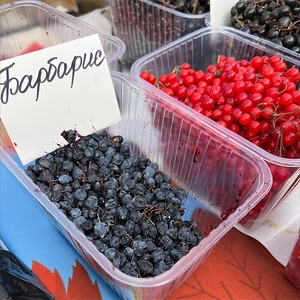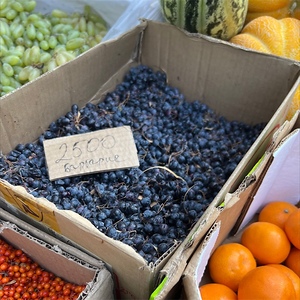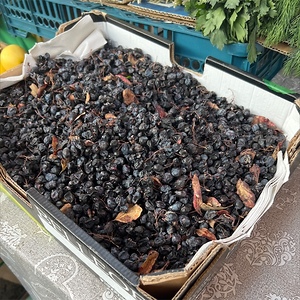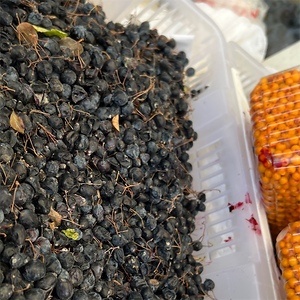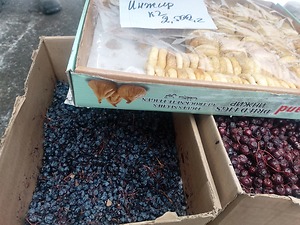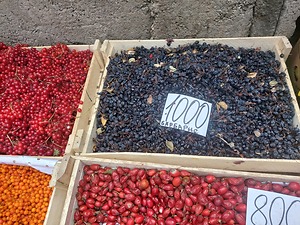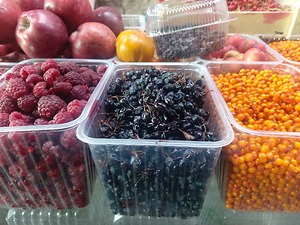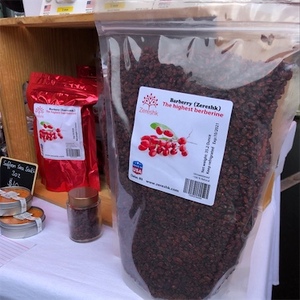


Kashgar Barberry Berries
Estimated Inventory, lb : 0
Description/Taste
Kashgar barberries are small, globular berries, averaging 1 to 3 centimeters in diameter, and have a round to elliptical shape, attached to slender stems and growing on a spiny and widely branched shrub. The berry’s skin is smooth, waxy, and taut, covered in a pale bloom, and is dark blue-purple, almost appearing black. Underneath the surface, the flesh is aqueous and pale purple with a soft and crisp consistency. Kashgar barberries are considered to have a balanced, sweet and sour flavor with some acidity and tartness.
Seasons/Availability
Kashgar barberries are available in the summer through winter in Asia. In China, the fruits are typically gathered from July through September.
Current Facts
Kashgar barberries, botanically classified as Berberis kaschgarica, are a rare variety belonging to the Barberry family. The fruits grow on deciduous shrubs reaching up to one meter in height and are named after their native region, Kashgar, a city in Western China known as an important stop for trade along the Silk Road. It is also found in limited quantities in the neighboring country of Kyrgyzstan. Kashgar barberries were listed on the Red List of Endangered Species in 1985, which was created by the International Union For Conservation Of Nature and is a list that brings awareness to the status of threatened plants and animals. The variety is now considered stable, but it is still challenging to find due to limited habitat and availability. Despite its rarity, Kashgar barberries are favored as a specialty, ornamental home garden plant in the shrub’s native region and are valued for their resistance to extreme weather temperatures and prolific nature, bearing numerous dark blue-purple berries. These tiny berries can also be used in various culinary applications and add sweet-tart flavors to sweet and savory dishes.
Nutritional Value
Kashgar barberries are a good source of vitamin C, which is an antioxidant that can help protect and boost the immune system. The berries also contain anti-inflammatory properties and acids that can help cleanse the body and remove toxins.
Applications
Kashgar barberries are best suited for both raw and cooked applications such as boiling and baking. The berries can be consumed fresh, out-of-hand, tossed into salads, used as a topping over ice cream, or they can be juiced as a sweet-tart beverage. The berries can also be crushed and steeped in boiling water to make a tea, fermented into wine, boiled into a syrup, compote, or filling for baked goods and pastries, or cooked into jams and jellies. In addition to sweet preparations, Kashgar barberries can be paired with cooked meats, salted and pickled, or dried and mixed into rice dishes. They are also well-suited in spicy dishes for added acidity with a hint of sweetness. Kashgar barberries pair well with pomegranate juice, dark chocolate, horseradish, meats such as veal, goose, poultry, and beef, almonds, and spices such as coriander, cinnamon, and cumin. The fresh berries will keep 1-2 weeks when stored in the refrigerator. Dried berries will keep up to sixteen months when stored in a cool, dry, and dark place.
Ethnic/Cultural Info
In Asia, barberries have been used in traditional folk medicine for thousands of years to help increase immunity and reduce symptoms associated with fevers, loss of appetite, and colds. The berries are commonly infused into decoctions and teas for their antioxidants and vitamin C and are consumed as a natural booster. Dried barberries are also sometimes used in teas, and the acidity found within the berries can act as a substitute for lemon in the healing medicinal drinks.
Geography/History
Kashgar barberries are considered native to Asia and have been growing wild since ancient times. The species is found in China's Northwestern and Western regions and extends west to Central Asia. Kashgar barberries thrive on mountainsides, alongside rivers, and in alpine grasslands and are considered rare, only gathered in limited quantities. Today, Kashgar barberries are sold fresh through local markets in their growing regions in China, Kyrgyzstan, Kazakhstan, Tajikistan, Pakistan, Tibet, and the region of Kashmir in India. Dried Kashgar barberries are also imported on a small scale from Kyrgyzstan to Germany.
Recipe Ideas
Recipes that include Kashgar Barberry Berries. One
| The FeedFeed |
|
Vegan Zereshk Polo Ba Morgh |



